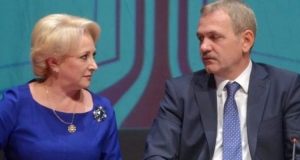 On Wednesday, the Government adopted an Ordinance aimed at establishing a commission for preparing the timetable for Romania’s accession to the single European currency.
On Wednesday, the Government adopted an Ordinance aimed at establishing a commission for preparing the timetable for Romania’s accession to the single European currency.
Prime Minister Dancila’s initiative was preceded by PSD President Liviu Dragnea, who said at the beginning of the week that the National Commission for approving the establishment plan for adopting the euro in 2024 will be created.
The problem of the two party and state officials is that such a structure exists for almost a year and a half.
It is true, it is not a commission, but an inter-ministerial committee whose „original sin” is that it was founded by „technocrats” (the decision has been issued on December 8, 2016 – LINK HERE).
A difference between the two structures – the old committee (which is likely to be eliminated) and the new commission – exists though:
while the committee was coordinated by the Prime Minister, the Minister of Public Finances and the BNR Governor, the commission will be headed by two co-presidents – the Prime Minister and President of the Romanian Academy – and by two vice-presidents – the BNR Governor and a deputy prime minister with powers in this field.
On Wednesday, while speaking at the plenary government meeting, Prime Minister Dancila insisted that, although the changeover to euro has been discussed, Romania never had a period set for that.
Reality is, however, fundamentally different: Romania has put forward several terms for completing the move to the European single currency.
Some of them clear, others very vague:
- In 2012, Prime Minister Victor Ponta (PSD) set 2019 as the target date
- In April 2017, Prime Minister Sorin Grindeanu (PSD), at the end of a meeting of the inter-ministerial committee, announced that the euro adoption would be possible only after Romanians’ incomes would be close to those in other EU states
- In August 2017, Foreign Minister Teodor Melescanu (now a member of Dancila government) told foreign media that the changeover to euro will take place in 2022
Moreover, Romania has, since April 27, 2016, a Convergence Program for the period 2016-2019.
The problem of PSD governments, starting with Victor Ponta, is that they approached the changeover to euro as a slogan and almost nothing from what should have been done practically in terms of convergence or competitiveness has been promoted to achieve the targets set.
Moreover, the last three government experiments compromised three important elements: the consolidated budget deficit, inflation and long-term interest rates.
And the current economic policies also target a fourth criterion: the share of public debt in GDP.
What Prime Minister Viorica Dancila knows about euro
„I believe that adopting the euro is the most important project after joining the European Union (EU). Consequently, through an OUG, we will establish the National Commission for the establishment plan for adopting the euro. This commission will prepare Romania’s timetable for entering the single mechanism of the eurozone accession as well as the necessary actions for preparing the economy but also the Romanian society for this important step,” Dancila said.
The prime minister said that, in order to ensure a broad representation, the commission will bring together representatives of the government, local public administration, academia, Presidency, non-governmental organizations and employers’ and trade union confederations.
„It will be a broad representation so that we can have a fair debate that will allow us to make the best decisions. This commission will be headed by two co-presidents, the Prime Minister and the President of the Romanian Academy, and two vice-presidents, the Governor of the National Bank of Romania (BNR) and the Deputy Prime Minister for Economic Affairs,” Viorica Dancila said.









